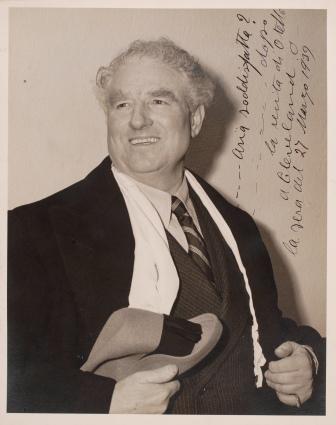Martinelli talks about Martinelli - Giovann iMartinelli
Main menu:
Martinelli talks about Martinelli
MARTINELLI TALKS ABOUT MARTINELLI
Seattle, 1967 - Conference -
Ladies and Gentlemen, My Friends, Virtually every composer of opera from Monteverdi of 350 years ago to the present day has made the tenor his hero in majority operas. I was - I am a te-nor - but I don't feel heroic now. However, those of you who are about middle age, and be-yond, may remember when I was a hero - right here in your own beautiful city - . Let me tell you the story. Many years ago - more than I care to admit or you to recall - I sang a concert here. It was my custom on my first appearance at a theatre to locate a convenient exit door in case I might have to leave the stage hurriedly. On that occasion I followed my usual practice and took notice of the backstage emergency exit …. Fine!
Midway in concert an alarm bell sounded followed by others in rapid succession. It all signified only one thing - Fire! I looked around (naturally with the exit in mind). I saw no flame
- smelled no smoke - and over thousand people were in front of me. Should I rush to the exit
door? People were standing - panic was in the air. What was Martinelli to do? A tenor has but a single thought when danger looms - sing and sing I did - standing smiling and poised at the piano. The audience seemed reassured and sat down. What had happened was that the watchman standing backstage listening to my singing had forgotten to do his job - to wind up the devices controlling the alarms. He was not reproached and the next day I was acclaimed a hero.
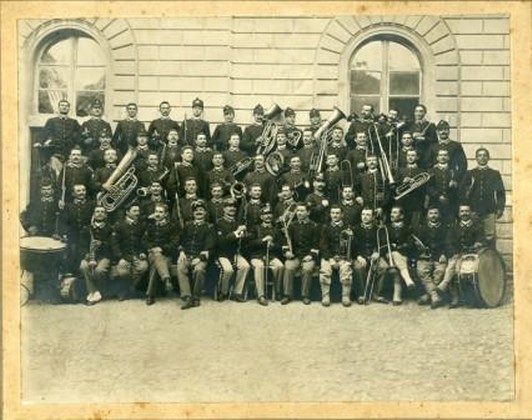
Quando suonava il clarinetto nella banda militare nel 1908 (Martinelli è il quarto dall'alto, in terza fila)
This time I not going to sing for you. I'm just going to talk to you. About what? About me.
“ Martinelli talks about Martinelli”. But only as the link between the music we all love and you, my listeners, today. A troubadour recounting his adventures for the past 60 years - 54 of which have been spent in our wonderful America.
To do this, I must ask your indulgence in one matter. I detest the constant use of pronoun ”I”
- yet - they are my experiences that I must talk about and I do not have the right to use the editorial “We”. I know that as a youth I sat at the feet of my elders and listened with reverence to the wisdom and knowledge of their achievements. Now the position is reversed and by reason of
the accomplishments of my lifetime I can talk to you. I was there - I saw and heard - and is my story.
My father was a very good cabinet maker (and so was I ) in a little town in the North of Italy.
I was the oldest of fourteen children and helped support the family from childhood doing anything even picking grapes for wine and attending to all the chores of a farmer boy. Perhaps that is where I gained my strength - it was a wholesome life - and the main course was a vegetable soup.
So what? I loved it and if any of wish to feed me today - give me first a fine bowl of soup and I'll be most happy with whatever you serve thereafter.
I started to sing at the age of six in church as a boy contralto. Since I had a natural voice I was asked to do solos at that age, I can say truthfully that I have now been singing before the
public for more than three quarters of a century. At eleven my voice started to change, and silence was my lot until I was seventeen when a tenor voice evolved. It was during this period when, unable to sing, I began to study the clarinet which, since it was mostly just blowing, was easy for a tenor and enable me to continue with my music. At twenty I entered the army and because of the clarinet training was selected as a member of the regimental band.
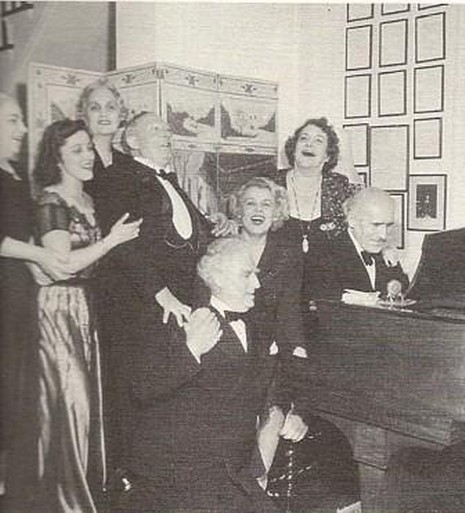
Giovanni Martinelli in una foto con Giuseppe De Luca (alle sue spalle), Arturo Toscanini (al pianoforte) e colleghe
Naturally I sang -without training - the song and arias that any Italian boy would have sung at the age. One day, while singing at an open window in the barracks, I was heard by my commanding officer, who decided I had talent which should be developed. I was taken to Milan and there, against strong protests on the part of my father, was given a scholarship in the form of a contract to study.
After six months of study my sponsors wanted to hear me and judge my progress. It was a complete fiasco. The freshness, naturalness, and spontaneity of voice which they had heard at my original audition were gone. My six months' study was a disastrous mistake and they were ready to cancel the contract and send me home. You can imagine my despair. Their opinion was that my voice was not lost nor but I was just on the wrong track.
Fortunately, Giuseppe Mandolini, a former tenor, then working as a bookkeeper for my sponsor heard me as did Tullio Serafin, the great conductor. Mandolini understood my problem and with the support of Serafin asked for three months in which he was certain he could restore my voice and put me in the right line. It will interest you to know that in 1908 before starting my lessons in Milano I was asked by the local committee of my hometown, Montagnana, to take the role of Messaggero in “Aida”, the opera which was given for twelve performances at what they sued to call the Autumn Festival, and I was paid three Lire per performance ( equal to $ . 60 per performance today ).
My official debut came on December 29, 1910, when I sang the title role of Verdi's “Ernani” at the Teatro dal Verme in Milano. I also sang “Ruy Blas” at the same theatre, and after a while word got around that young upstart Martinelli might not have had much experience, but he did have a strong pair of lungs. One day, the theatre manager who was also my sponsor, told me I was to sing an audition for someone. I came out on stage, looked into the darkened auditorium and saw no one. A voice asked what I would sing. As I recall, I chose “Celeste Aida”and“Cielo e mar” from “Gioconda”. When I finished, two men came on stage, and my heart stopped. I was only at the threshold of my career but all Italy knew Arturo Toscanini and Giacomo Puccini. Puccini was then fifty-three years of age, fairly tall and thoroughly masculine in appearance and voice. He grasped my hand firmly and said. “Bravo, young man, I think you will do”. Then explanation was given. Puccini's “Fanciulla del West” which had received its world premiere six months before at the Metropolitan with Caruso, Destinn and Amato, was to receive its European premiere at the Teatro Costanzi in Roma that summer.
Caruso was not available and the part of Dick Johnson, the tenor was assigned to Amedeo Bassi. However, because Bassi had contracted to participate in the Coronation Season of George V in London another tenor was required as a replacement and I was chosen for the assignment.
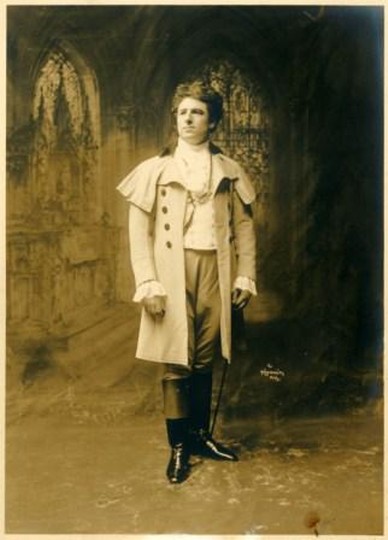
Mario Cavaradossi in Tosca
I was from these performances that my career really began. Puccini was so pleased with my singing of “Fanciulla” that he asked La Scala to engage me for “Fanciulla” despite the fact that I had been singing in Milano's second theatre - the Dal Verme - with Claudia Muzio in performances of “Manon Lescaut” under the baton of Ettore Panizza. The performances of both of these operas launched my international career at Covent Garden, London, Monte Carlo, Budapest, Brussels and other European capitals.
Puccini helped me much throughout my career. His recommendation along with that of Toscanini brought about my engagement by Giulio Gatti-Casazza, the general manager of the Metropolitan in 1923. Originally, I had more success with Cavaradossi in“Tosca” than with any other part. In London, I was forced at my debut to encore the last act aria, “E lucevan le stelle”, twice, making a total of three times that I sang it in succession. In America I was loaned by Gatti-Casazza to the Philadelphia company, where I made my American debut in “Tosca” with Mary Garden, God bless her soul,and Vanni-Marcoux. Mary would lean over him and snarl,”Voilà, c'est fait”,before saying her more familiar lines, “Davanti a lui tremava tutta Roma”.
One of the last times I saw Puccini was in 1921, three years before his death. He spoke enthusiastically about a new opera he was writing called “Turandot”. He told me that the tenor part was half completed and sat down and played the last act. Puccini said he would like to have me create the part at La Scala and he hoped to have it ready by 1923. As you all know, the cancer of the throat that killed him in 1924 slowed his writing and last scene of the opera had to be finished by the composer Alfano. Gatti-Casazza refused to give me time off from the Metropolitan, so I lost the chance to create the part and did not sing it until the Coronation Season at Covent Garden in 1937. But I was the first tenor to sing “Nessun Dorma”.
Now, let me play for you a recording taken from the stage at Covent Garden during a performance of “Turandot” in 937. The “Nessun Dorma” and the final part of Turandot's great aria, “In questa reggia”, beginning with the words: “O principe” and climaxes with two sustained high “C” by the soprano and tenor. Eva Turner, England's magnificent dramatic soprano, is the artist who sings with me in this excerpt. In 1912 I sang my initial Canio in“Pagliacci”, a role in which I ppeares over 200 times. When I heard Caruso at the Metropolitan in 1923,I realized I would ave to do something to make my own interpretation a bit different. I went to Leoncavallo and asked for his help. The composer of “Pagliacci” looked at me in amazement and a it of disgust. “Martinelli”,he laughed, “you ask me for help when you have the greatest Canio of my dreams at the Metropolitan to watch. Go ask Caruso for help”. I worshipped Caruso,but hesitated to ask. Apparently Leoncavallo wrote to him about my request because Caruso invited me to attend his rehearsals. One evening after a fabulous performance I went to his dressing room and I truly did not know what to say. He asked me:“Did you like my Canio
tonight, Giovanni?” “What can I say o you, Enrico,” I answered. “I still have not recovered
from the experience.” Then he asked: “Do you like my costume?” I replied: “I cannot imagine any other costume for “ Pulcinella”. He turned to his valet anddirected, “Tomorrow take my costume to Giovanni. It is his from now on”. I received the cleaned costume the next day. I never wore it, but preserved it as one of the most precious of my mementos.
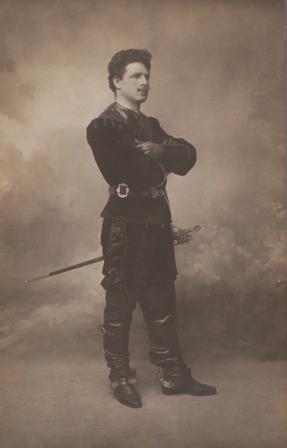
Caruso showed me where to save and where to give emotion as Canio and also how to attack the great finale of the “Vesti la giubba” in two breaths, so that the legato line is never broken. He also insisted I use his innovation in the score in the music which follows the “Vesti la giubba”. Here the anguished Canio staggers through the curtain of the little theatre and before entering he cries out words not written in score - “Infamia. Infamia” - as
the aging man realizes that his pretty young wife has taken alover. The very soul of man is revealed in his despair at this moment and one can hardly breathe in the theatreif the Canio is sincere in his feelings. Let me play you a recording made on the stage of “Vesti la giubba” whit the cries of “Infamia, Infamia” and listen to the reaction also of the audience.
In 1917, the Metropolitan presented “Faust” with Geraldine Farrar, Leon Rothier, Pasquale Amato and myself under Pierre Monteux. “ Faust” was my second opera in French, “Carmen” having been the first. I studied hard with Monteux and received much assistance also from Rothier who had been selected for study at the Academy in France by Charles Gounod, composer of “Faust”. I also worked with Nellie Melba and more particularly in Cleveland with Emma Eames, of whom Gounod said, “This is my perfect Margherita”. So I was well prepared in this work which gave me the chance to display again the long legato line so necessary to a romantic opera of this kind. The exceptional demands on the high register also prepared me for great French dramatic parts I was to assume in later years - the Juive, the Prophetes”, and the “Samsons” of the 1920's. At this time my voice was at its peak both in the lyric and dramatic repertoire. I felt that I had an artistic as well as a vocal success. I should like to play for you the last part of Faust' aria, “Salut Demeure”, the second verse, with the music soaring to a sustained high C in an unbroken lyric line.
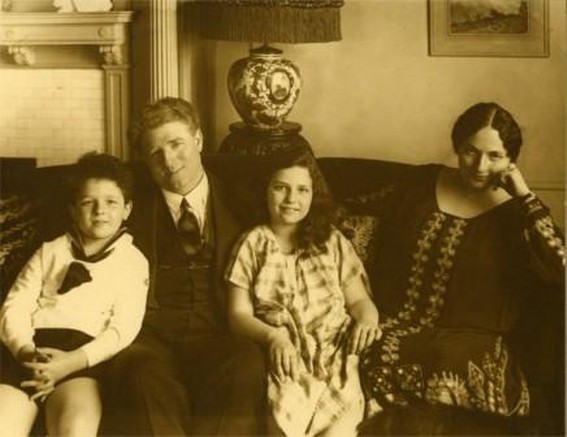
Con la moglie Adele e i figli
Perhaps the greatest of the French roles I sang was that of Eleazar in “La Juive”. I had heard Caruso, of course, sing it in 1919 and 1920. He was incredibly good and I was inspired to ry the same part. Caruso's death caused “Juive” to be dropped from the repertory. I engaged Salvatore Fugito, Caruso's accompanist, as my pianist and coach after Enrico's passing. He brought parts of opera to me and asked that I try them. I absorbed the score and in December of 1923 went to Gatti-Casazza and told him I was ready, if he ever decided to do the opera again. As this role required the portrayal of an elderly man (the supposed father of the heroine - not her lover -) deeply imbued with the spirit and practice of his religion and a dedication for vengeance I did not want erely to imitate Caruso's interpretation but to create my own conception of this powerful character. I found my way to visit homes where aged Jewish men spent their declining years and observed their manner of speech, behaviour, gesturing, walking, etc. On December 13, 1924, the opera was given and I sang the role of Eleazar. The first performance was most successful but already inside me was the incubating typhoid fever germ and almost immediately after the performance I was stricken. For six weeks I hovered between life and death while the newspaper pointed out the similarities in the cases of Caruso and me - and called “Juive” a jinx opera. (“Juive”, you may remember, was the last complete performance of Caruso's career.) Finally, after three months I as well enough to return to the stage. I made my reappearance in “Pagliacci”, and then Gatti-Casazza I thought that belief in jinxes was a remnant of paganism and I had faith in myself and God. I sang “Juive” and continued to do so for another twenty years. I'm sure you all know the famous aria of the fourth act sung y Eleazar, “Rachel, quand du Seigneur”, which Caruso made so famous. Allow me to play the last part of for you now as I recorded it in 1924, the first year I sang the opera. Let me,at this point, go to back a bit -in fact to 1915. When I first sang "Trovatore"at the Metropolitan.
Add “Trovatore”, “Aida” and “Otello”
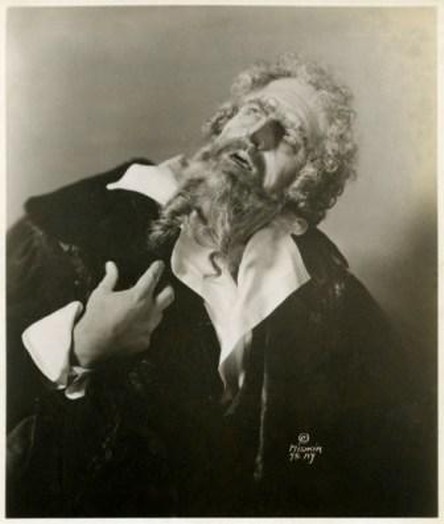
Eleazar ne: La Juive
Which of all the operas I sang did I like the best ? Impossible to say. It all depended on the circumstances - my fellow artists and where a certain presentation was to be made. As an artist I loved them all and if given a chance to return to my youth, I' d sing them all again with the same delight and enthusiasm I have had for more than half a century.
But of the composer, I can make a choice.To me, Verdi was the King. He was my Emperor of Opera - and I was but a disciple gifted by Almighty God with the power to interpret the King of Music's message to the world. This is my epitaph and no man could have a prouder one.
I hope I have fulfilled your expectations, and you have found my personal observations interesting.
Thank you
Giovanni Martinelli
